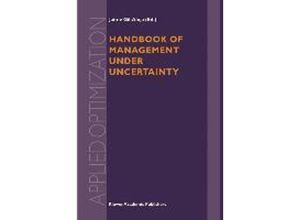A mere few years ago it would have seemed odd to propose a Handbook on the treatment of
management problems within a sphere of uncertainty. Even today on the threshold of the third
millennium this statement may provoke a certain wariness. In fact to resort to exact or
random data that is probable date is quite normal and con venient as we then know where we
are going best where we are proposing to go if all occurs as it is conceived and hoped for. To
treat uncertain information to accept a new principle and from there determined criteria
without being sure of oneself and confiding only in the will to better understand objects and
phenomena constitutes and compromise with a new form of understanding the behaviour of current
beings that goes even further than simple rationality. Economic Science and particularly the
use of its elements of configuration in the world of management has imbued several generations
with an analytical spirit that has given rise to the elaboration of theories widely accepted by
the international scientific community. In this work we are proposing something a little more
modest: to use in the best possible way data and information that are available for drawing
up and applying techniques and instruments that are useful for current reality within the world
of businesses and institutions in an attempt to mislead ourselves as little as possible.



